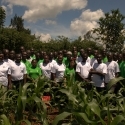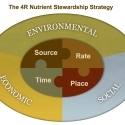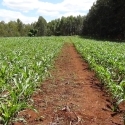05 Jun 2015
4R Nutrient Stewardship for Crop Production Intensification in Ethiopia
 Shamie Zingore, Adrian Johnston and James Mutegi during a site selection visit in Ethiopia
Shamie Zingore, Adrian Johnston and James Mutegi during a site selection visit in Ethiopia
Agriculture in Ethiopia is dominated by smallholder farmers whose crop productivity has been low with a national average yield of less than 2t ha-1 and 0.8 t ha-1 for cereals and pulses respectively. This is mainly as a result of low soil fertility and limited use of nutrient inputs and best agronomic practices. Over the past decade, the Government of Ethiopia has developed several policies aimed at improving crop productivity. The success of these policies has however been constrained by lack of up-to-date data on site specific soil fertility characteristics and fertilizer recommendations. To bridge this gap, the IPNI SSA Program has launched a 4 year project focusing on out-scaling of 4R nutrient stewardship knowledge to support crop production intensification in Ethiopia. Funded by the International Fertilizer Association (IFA), the project will work towards developing approaches and tools for effectively transferring 4R Nutrient Stewardship knowledge to extension systems and smallholders, to ensure sustainable crop production intensification. The project is being implemented in collaboration with the Ethiopian Institute of Agricultural Research (EIAR), Agricultural Transformation Agency (ATA), the Ministry of Agriculture, and The International Maize and Wheat Center (CIMMYT). On farm trials have been established in six major sites under CIMMYT (Jimma, Hawassa and Bako) and ATA (Marawi, Achafer and Bure-Fente Salam) and managed by extension officers trained on establishment and management of field trials. These field sites will serve as learning centres for farmers on best nutrient management practices while at the same time providing scientific insights on key nutrients limiting crop productivity. The project will borrow on lessons learnt from the implementation of a similar project in Western Kenya which has generated strong evidence for the potential to intensify maize productivity based on balanced nutrient use.









